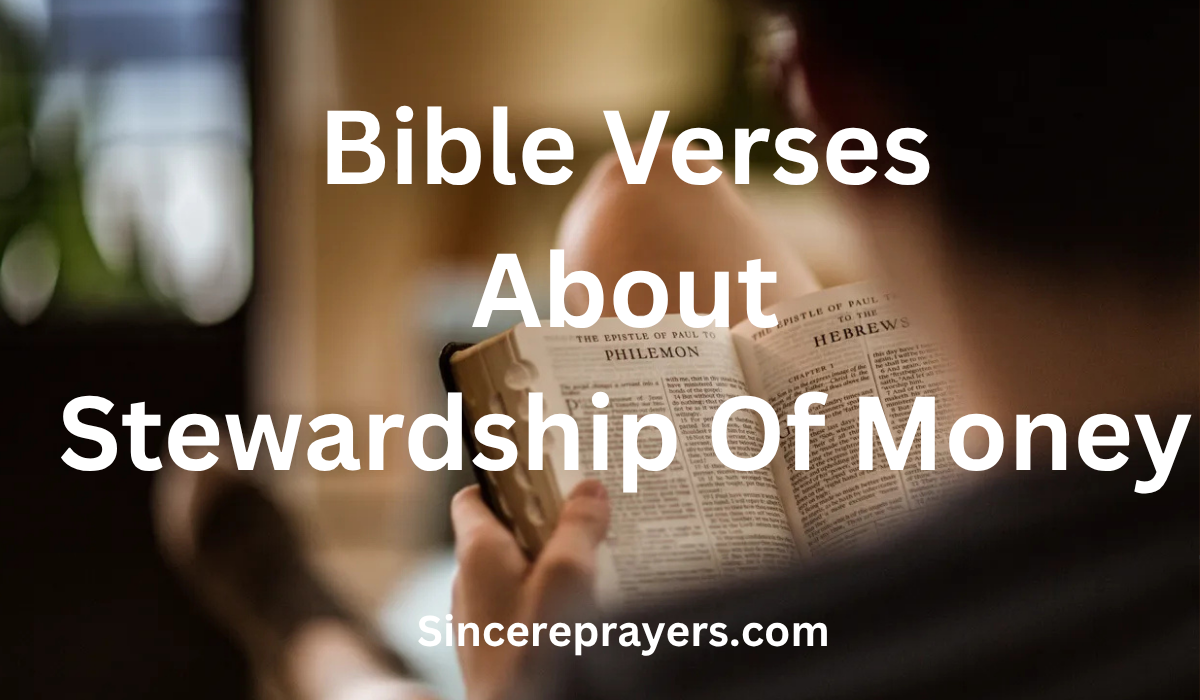Unquestionably, money affects our day-to-day existence. It frequently determines how we spend our time and energy, from providing for our families to meeting our fundamental requirements. Scripture teaches us, however, that money is not intrinsically bad; rather, how we handle it reflects our beliefs and values. Biblical financial stewardship is about acknowledging that everything we own is God’s, not just about setting a budget and conserving money. We are trusted to faithfully and prudently manage resources as His stewards.
Stewardship includes how we earn, save, invest, spend, and share—it’s not simply about helping others or donating to the church. The Bible verses about stewardshipp of money makes it very evident that having sound financial judgment is a practical as well as a spiritual obligation. Jesus’ teachings, parables, and proverbs highlight how our financial behavior reveals the state of our hearts. Making financial decisions that are in line with God’s will and giving priority to long-term assets over short-term profits is what it means to be a good steward.

The bible verses about stewardship of money is filled with both cautions and exhortations about riches. Jesus teaches us the benefits of generosity while cautioning against the love of money. While Proverbs provides timeless insight on diligence, planning, and justice in financial dealings, the apostle Paul reminds us that godliness with contentment is great gain. Every word acts as a road map, pointing us in the direction of a life that reflects God’s kindness and praises Him with our financial situation.
This compilation of thirty-five potent Bible texts regarding financial stewardship will encourage, educate, and test us to live with faith-based financial knowledge. May you be inspired to trust God as your provision, develop a giving attitude, and manage your resources in ways that honor Him as you consider each scripture.
35 Powerful Bible Verses About Stewardship Of Money in 2025
1. Proverbs 3:9
“Honor the Lord with your wealth, with the firstfruits of all your crops.”
This verse reminds us that stewardship begins with acknowledging God as the rightful owner of all we possess. Offering the firstfruits is an act of worship that shows trust in His provision and priority in our lives. Rather than giving God leftovers, we are called to put Him first in our finances. Honoring the Lord with our wealth demonstrates gratitude, obedience, and faith that He will continue to meet our needs.
2. Matthew 6:24
“You cannot serve both God and money.”
Jesus emphasizes the heart of stewardship by highlighting divided loyalties. Money itself is a tool, but when it takes the place of God, it becomes an idol. A true steward keeps financial pursuits in submission to God’s will, ensuring that wealth does not dictate values or priorities. This verse calls us to examine who or what we are serving. Faithful stewardship means choosing devotion to God over the deceptive power of money.
3. 1 Timothy 6:10
“For the love of money is a root of all kinds of evil.”
Paul warns that misplaced affection for money leads to destruction and misplaced priorities. The verse does not condemn wealth itself but rather the unhealthy desire for it. When money becomes the focus, it can lead to greed, corruption, and even a departure from faith. Stewardship requires contentment and discipline, ensuring that money remains a servant, not a master. True wealth lies in godliness, generosity, and dependence on God’s provision.
4. Luke 16:11
“If you have not been trustworthy in handling worldly wealth, who will trust you with true riches?”
Here Jesus teaches that stewardship of money is connected to greater spiritual responsibility. Earthly wealth is temporary and a testing ground for our faithfulness. If we cannot manage material resources wisely, how can we be trusted with eternal treasures? This verse challenges us to view money as a tool for discipline, integrity, and service. Faithful financial stewardship opens the door to deeper spiritual blessings and divine trust.
5. Proverbs 13:11
“Dishonest money dwindles away, but whoever gathers money little by little makes it grow.”
This proverb highlights the importance of honesty and patience in financial stewardship. Wealth gained quickly through corruption or greed often disappears, while diligent work and careful saving produce stability. Stewardship involves resisting shortcuts and being content with gradual progress. God honors integrity and consistent effort, teaching us that lasting provision comes not through deceit but through faithfulness. This verse encourages trust in steady diligence rather than reckless or dishonest pursuits.
6. Malachi 3:10
“Bring the whole tithe into the storehouse, that there may be food in my house.”
God invites His people to honor Him with tithes as a demonstration of faith and obedience. Stewardship of money includes giving back to God from the resources He provides. This verse also contains a promise—when we give faithfully, God pours out blessings that overflow. Tithing is not about loss but about aligning our hearts with trust in God’s provision. Faithful giving sustains His work and strengthens our relationship with Him.
7. 2 Corinthians 9:7
“God loves a cheerful giver.”
Paul emphasizes the heart behind stewardship, showing that giving should flow from joy rather than obligation. A cheerful giver recognizes that generosity is both a privilege and an act of worship. Stewardship is not about reluctantly parting with money but freely blessing others as God has blessed us. Joyful giving reflects a heart aligned with God’s love. This verse reminds us that attitude matters as much as action when managing resources.
8. Proverbs 22:7
“The borrower is slave to the lender.”
Debt can place us in a position of bondage, limiting freedom and opportunities. Wise stewardship includes avoiding unnecessary borrowing and living within our means. While debt may sometimes be unavoidable, Scripture warns that dependence on lenders places us under their control. Good stewardship involves planning, saving, and exercising discipline to remain financially free. This verse urges us to manage money with foresight, ensuring that we remain servants of God, not enslaved by debt.
9. Luke 12:15
“Watch out! Be on your guard against all kinds of greed; life does not consist in an abundance of possessions.”
Jesus warns that greed distorts our view of life and stewardship. Accumulating possessions does not define our worth or guarantee fulfillment. True life comes from our relationship with God, not from material wealth. Stewardship calls us to resist greed and live with contentment. This verse urges us to measure life by eternal values rather than earthly possessions, reminding us that joy and purpose cannot be bought with money.
10. Matthew 25:21
“Well done, good and faithful servant! You have been faithful with a few things; I will put you in charge of many things.”
This verse, from the parable of the talents, reveals the reward of faithful stewardship. God values how we manage both small and large responsibilities. Being trustworthy with limited resources prepares us for greater blessings and opportunities. Financial stewardship is about faithfulness, not the size of wealth. God looks at our diligence, obedience, and integrity. This promise encourages us to be good stewards, knowing that faithfulness leads to eternal commendation and reward.
11. Proverbs 21:20
“The wise store up choice food and olive oil, but fools gulp theirs down.”
This proverb highlights the difference between wise stewardship and wastefulness. A wise steward saves and prepares for the future, while a foolish person spends recklessly without thought. Stewardship involves discipline, foresight, and restraint, ensuring resources are preserved and used wisely. God calls us to manage money with prudence, avoiding extravagance. This verse shows that financial wisdom is not only spiritual but also practical, bringing stability and provision for life’s uncertainties.
12. Hebrews 13:5
“Keep your lives free from the love of money and be content with what you have.”
The writer of Hebrews reminds us that true security comes from God, not from wealth. Contentment is central to stewardship, allowing us to live in peace without greed. When we pursue money above all else, we fall into dissatisfaction and restlessness. Stewardship means trusting God’s sufficiency and being grateful for His provision. This verse assures us that with God by our side, we need not chase after endless financial gain.
13. Deuteronomy 8:18
“But remember the Lord your God, for it is he who gives you the ability to produce wealth.”
Moses reminds Israel that wealth and success come from God’s blessing, not from personal strength alone. Stewardship involves humility, recognizing God as the source of every skill, opportunity, and resource. When we forget Him, we risk pride and misuse of money. This verse teaches us to give God credit for our prosperity and to use wealth to serve Him and others. Stewardship starts with gratitude and acknowledgment of God’s provision.
14. Proverbs 11:24
“One person gives freely, yet gains even more; another withholds unduly, but comes to poverty.”
This proverb reveals the paradox of stewardship—generosity often leads to abundance, while hoarding leads to lack. God’s economy operates differently from human logic. When we give freely, we open ourselves to God’s blessings and enrich others’ lives. Withholding out of fear or selfishness results in spiritual poverty. This verse encourages us to trust God by being generous stewards, knowing that He rewards open hands with overflowing provision.
15. Acts 20:35
“It is more blessed to give than to receive.”
Paul quotes Jesus to emphasize the joy of giving. True stewardship finds fulfillment not in accumulation but in sharing. Giving blesses both the receiver and the giver, bringing spiritual satisfaction and drawing us closer to God’s heart. This verse reminds us that wealth is not for self-indulgence but for service. Stewardship calls us to live generously, experiencing the deeper blessings of selflessness and compassion.
16. Matthew 6:19-20
“Do not store up for yourselves treasures on earth… But store up for yourselves treasures in heaven.”
Jesus contrasts temporary earthly wealth with eternal heavenly treasures. Earthly possessions are vulnerable to loss, but heavenly investments are everlasting. Stewardship means prioritizing eternal values—acts of love, generosity, and obedience—over material accumulation. This verse challenges us to evaluate where we place our treasure and trust. Faithful stewardship aligns our money with God’s kingdom purposes, ensuring that our wealth contributes to eternal rewards rather than fleeting satisfaction.
17. Proverbs 19:17
“Whoever is kind to the poor lends to the Lord, and he will reward them for what they have done.”
This verse shows that helping the poor is an act of stewardship that honors God directly. When we give to the needy, God considers it as giving to Him. He promises to repay our generosity, not always materially but in blessings that far surpass earthly wealth. Stewardship calls us to use money as a means of compassion. This verse highlights generosity as an investment in God’s eternal kingdom.
18. Ecclesiastes 5:10
“Whoever loves money never has enough.”
Solomon points out the futility of greed. No matter how much a person has, the love of money leads to endless dissatisfaction. Stewardship warns us against chasing wealth as the ultimate goal. True fulfillment comes from God, not from possessions. This verse teaches contentment and warns of the trap of endless accumulation. Wise stewardship keeps money in perspective, using it as a tool rather than allowing it to dominate our desires.
19. Philippians 4:19
“And my God will meet all your needs according to the riches of his glory in Christ Jesus.”
Paul assures believers that God is the ultimate provider. Stewardship includes trusting Him to supply our needs rather than relying solely on wealth. This verse reminds us that God’s provision is abundant and rooted in His glory, not in our efforts alone. Faithful stewardship involves managing resources wisely while resting in God’s faithfulness. With this assurance, we can live generously without fear of lack.
20. Psalm 24:1
“The earth is the Lord’s, and everything in it.”
This verse establishes the foundation of stewardship: ownership belongs to God. Everything we possess—money, resources, land, and wealth—comes from Him. We are caretakers, not owners. Stewardship means managing resources according to God’s purposes and recognizing that we are accountable to Him. This truth changes our perspective, helping us use wealth responsibly, generously, and in alignment with God’s will. Acknowledging His ownership keeps us humble and faithful in stewardship.
21. Luke 14:28
“Suppose one of you wants to build a tower. Won’t you first sit down and estimate the cost?”
Jesus teaches the value of planning and foresight in stewardship. Just as builders plan before construction, faithful stewards plan before spending. Wise financial management includes budgeting, counting the cost, and making responsible choices. This verse warns against careless or impulsive financial behavior. Stewardship involves thoughtful planning that reflects discipline and accountability. When we count the cost, we honor God by ensuring our resources are used effectively and responsibly.
22. Proverbs 28:20
“A faithful person will be richly blessed, but one eager to get rich will not go unpunished.”
This verse contrasts faithfulness with greed. A faithful steward, who manages money with integrity and diligence, receives God’s blessing. However, those obsessed with quick wealth often fall into destructive traps. Stewardship involves patience, consistency, and honesty, rather than chasing shortcuts. This verse encourages us to value long-term faithfulness over immediate gain. God rewards integrity, but greed and haste lead to ruin. Wise stewardship embraces trust in God’s timing and provision.
23. Matthew 19:21
“Go, sell your possessions and give to the poor, and you will have treasure in heaven.”
Jesus challenges the rich young ruler to prioritize eternal riches over earthly possessions. This radical call highlights stewardship as surrender—using wealth to serve others and follow Christ wholeheartedly. While not all are called to sell everything, the principle remains: generosity reflects where our treasure lies. This verse reminds us that stewardship involves letting go of selfish attachment to money and pursuing treasures that last forever in God’s kingdom.
24. James 5:5
“You have lived on earth in luxury and self-indulgence.”
James rebukes those who misuse wealth for selfish pleasure while ignoring the needs of others. Stewardship warns against indulgence that neglects responsibility to God and community. This verse teaches that wealth hoarded for self-centered living leads to judgment. True stewardship is not about luxury but about service, generosity, and accountability. God calls us to use money with compassion and wisdom, not to waste it in selfish extravagance.
25. 1 Chronicles 29:14
“Everything comes from you, and we have given you only what comes from your hand.”
King David acknowledges God as the ultimate source of all resources. This perspective shapes stewardship as giving back to God what already belongs to Him. When we tithe, give, or share, we are not sacrificing our own wealth but returning God’s blessings. This verse instills humility and gratitude, reminding us that our money, talents, and opportunities are entrusted to us. Stewardship means honoring God by offering back His gifts faithfully.
26. Proverbs 12:11
“Those who work their land will have abundant food, but those who chase fantasies have no sense.”
This verse highlights the value of diligence in stewardship. Hard work produces abundance, while chasing unrealistic schemes leads to lack. Wise stewardship requires discipline, effort, and focus on productive tasks. God blesses faithful labor, but idleness or reckless shortcuts hinder financial stability. This verse encourages practical stewardship—working honestly, avoiding distractions, and stewarding time and resources effectively. True prosperity comes from consistent effort aligned with God’s principles.
27. Luke 6:38
“Give, and it will be given to you. A good measure, pressed down, shaken together and running over.”
Jesus teaches that generosity brings overflowing blessings. Stewardship is not about clinging to wealth but releasing it to bless others. When we give, God multiplies both our resources and our joy. This verse assures us that giving creates a cycle of blessing—what we pour out returns in greater measure. Stewardship means trusting God’s abundance, knowing He rewards generosity beyond what we can imagine. Giving opens doors to divine provision.
28. Colossians 3:23
“Whatever you do, work at it with all your heart, as working for the Lord.”
Paul teaches that stewardship extends to our work ethic. Financial stewardship includes diligence, integrity, and wholehearted effort in our labor. When we work as if serving God, we honor Him and demonstrate faithful stewardship of opportunities. This verse reminds us that our jobs are not just about income but about service. Stewardship means using work as worship, reflecting excellence and commitment that glorify God in all we do.
29. Proverbs 10:22
“The blessing of the Lord brings wealth, without painful toil for it.”
This verse reminds us that true prosperity comes from God’s blessing, not from human striving alone. Stewardship means recognizing that success and provision flow from God’s hand. While hard work is important, wealth without God’s blessing is empty and unsatisfying. This verse encourages reliance on God rather than anxiety over money. Wise stewardship acknowledges His blessing, uses it responsibly, and rests in the peace that only He provides.
30. Matthew 25:29
“For whoever has will be given more, and they will have an abundance.”
Jesus explains that faithful stewardship multiplies resources and opportunities. Those who use what they have wisely receive more, while neglect leads to loss. Stewardship is about growth and responsibility, not stagnation. This verse encourages us to be diligent with even small resources, trusting God to expand them. When we steward faithfully, God increases both our influence and impact, allowing us to contribute more to His kingdom purposes.
31. Proverbs 14:31
“Whoever oppresses the poor shows contempt for their Maker, but whoever is kind to the needy honors God.”
This verse connects stewardship with compassion. How we treat the poor reflects our attitude toward God Himself. Using money to exploit others dishonors the Creator, while generosity brings Him glory. Stewardship calls us to act justly and show kindness through our resources. This verse reminds us that financial decisions are moral and spiritual, not merely practical. Honoring God with money includes uplifting the vulnerable and serving the needy.
32. Haggai 2:8
“The silver is mine and the gold is mine, declares the Lord Almighty.”
God declares ownership of all wealth, reminding us that money and resources ultimately belong to Him. Stewardship means managing wealth as caretakers rather than owners. This perspective changes how we use resources, shifting focus from selfish gain to God’s glory. When we acknowledge His ownership, we handle money with humility and accountability. This verse anchors stewardship in God’s authority, ensuring our financial choices honor His sovereignty.
33. Romans 13:8
“Let no debt remain outstanding, except the continuing debt to love one another.”
Paul instructs believers to live free from financial burdens, except for the obligation of love. Stewardship calls us to manage money responsibly, avoiding debt that hinders freedom and service. Love is the one debt we can never repay, guiding all stewardship decisions. This verse reminds us that wise financial management creates space to serve others effectively. True stewardship keeps us free to prioritize love and generosity above all else.
34. Matthew 6:33
“But seek first his kingdom and his righteousness, and all these things will be given to you as well.”
Jesus promises provision when we prioritize God’s kingdom. Stewardship involves placing spiritual pursuits above financial worries. When we seek righteousness first, God ensures our needs are met. This verse challenges us to reorder priorities, trusting God’s care instead of obsessing over wealth. Faithful stewardship recognizes that provision flows from God’s hand. By pursuing His kingdom, we discover financial peace, freedom from anxiety, and blessings aligned with eternal purposes.
35. 1 Peter 4:10
“Each of you should use whatever gift you have received to serve others.”
Peter reminds us that stewardship is not limited to money but includes all God-given gifts. However, financial resources are a practical way to serve others and glorify God. Stewardship calls us to use what we have—big or small—for the benefit of others. This verse highlights generosity as service, showing that money becomes meaningful when it blesses others. True stewardship uses resources for ministry, love, and building God’s kingdom.
Conclusion
Stewardship of money is about honoring God with what He has entrusted to us, not only about creating wealth or keeping budgets in balance. Everything we own is a gift from God, and it is our responsibility to manage it responsibly, according to what the Bible says time and again. Scripture encourages us to manage our resources intentionally, from tithe and giving to prudent saving and refraining from greed. Our attitude toward stewardship reveals whether we put our faith in wealth or in God to provide for us.
It takes both self-control and reliance to live as good stewards. Being disciplined guarantees that we manage our finances sensibly, stay out of debt, and spend our money in a way that is morally right. Dependency serves as a reminder that material riches is ephemeral and cannot guarantee long-term stability. God, who grants us the capacity to create riches and wants us to utilize it to benefit others, must be our ultimate source of faith instead. True stewardship is determined by how faithfully we handle what God has given us, not by how much we own.
We are reminded that money is a tool, not a master, as we consider these 35 verses. When properly managed, it can either become an idol that enslaves us or a resource that exalts God. We can live as obedient stewards by seeking God’s wisdom, being generous, and fighting the urge to adore money. By doing this, we accumulate wealth in paradise, where our real recompense awaits, in addition to enjoying God’s benefits in this world. May we make the daily decision to live as prudent stewards of God’s abundant gifts and to honor Him with our money.





